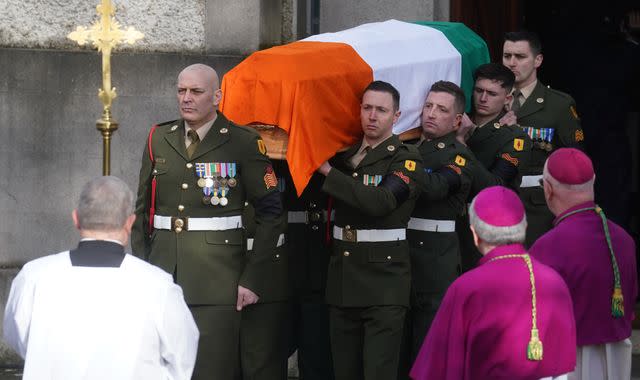John Bruton funeral: Irish leaders pay respects as former taoiseach is laid to rest

Ireland's former taoiseach John Bruton has been laid to rest at a state funeral in his hometown of Dunboyne, County Meath.
Mr Bruton, who served as taoiseach from 1994 to 1997, died peacefully in hospital at the age of 76 on Tuesday.
His funeral was attended by politicians past and present, with current Taoiseach Leo Varadkar among those who arrived at Saints Peter and Paul's Church on Saturday morning.
Irish President Michael D Higgins was also present to pay his respects, as were Northern Ireland's newly-installed first minister Michelle O'Neill and deputy first minister, Emma Little-Pengelly.
They joined Mr Bruton's wife, Finola, his children - Matthew, Juliana, Emily and Mary-Elizabeth - his brother, former minister Richard Bruton, and his grandchildren at the funeral.
Other political figures in attendance included Bertie Ahern and Enda Kenny, who both once served as taoiseach, and Irish Labour Party leader Ivana Bacik.
More from Sky News:
Police search Thames for suspected chemical attacker's body
Yellow weather warnings issued for swathes of England
In the homily, Father Bruce Bradley described Mr Bruton as "an exceptionally good man".
He said: "John was honest and honourable, patient and persevering, courageous and committed, 'willing to lead even when it meant going against the grain', as the Taoiseach Leo Varadkar has said, humble and unassuming, a man of integrity and truth."
After the service, Mr Bruton's coffin - draped in the Irish flag - was carried out of the church to the burial.
Mr Bruton's family was at his side when he died following a period of long illness.
As taoiseach, he was instrumental in working with the then British prime minister Sir John Major to launch the Anglo-Irish Framework Document in 1995, which proposed new relations between Ireland, Northern Ireland and the UK.
Sir John led tributes to Mr Bruton following his death and labelled him a "brave and talented" leader who "contributed mightily to the early days of the peace process".

 Yahoo News
Yahoo News 
